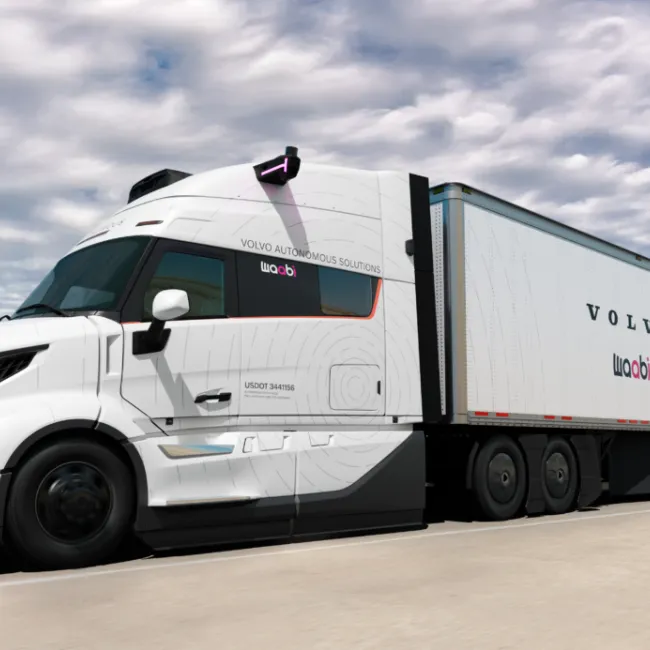
SHERIDAN, WYOMING – Feb. 4, 2025 – Waabi, a leader in generative AI for the physical world, and Volvo Autonomous Solutions have announced a partnership to accelerate the adoption of autonomous trucks in the United States. This collaboration combines Waabi’s advanced AI expertise with Volvo’s industry-leading automation and safety innovations, paving the way for a new era of safer, more efficient, and sustainable freight transportation.
A New Era of Autonomous Freight Transportation
This strategic partnership focuses on the vertical integration of Waabi’s virtual driver system, the Waabi Driver, into the Volvo VNL Autonomous. This autonomous truck, equipped with redundant systems for safe operation, will be produced at Volvo’s state-of-the-art New River Valley assembly plant in Virginia. The Volvo VNL Autonomous is built on the company’s autonomous technology platform, designed to support a wide range of operational needs, use cases, and Volvo Group truck brands. The goal of this collaboration is to transform the US$1 trillion North American freight industry by deploying autonomous trucks that set new standards for safety and efficiency.
Driving Innovation Through Collaboration
“At Waabi, we believe that vertically integrating next-generation AI technology directly into an OEM’s vehicle production is the path forward to bring safe, robust autonomous vehicles to the road, at scale,” said Raquel Urtasun, founder and CEO of Waabi. “Volvo’s leadership in safety, commitment to excellence in engineering, and investment in forward-looking innovation make them an ideal partner to realize the future of self-driving trucks everywhere.”
Prioritizing Safety, Efficiency, and Sustainability
Both Waabi and Volvo are deeply committed to developing autonomous transportation solutions that prioritize safety, efficiency, and sustainability to address the challenges facing the transportation industry today. Waabi emphasizes its next-generation AV2.0 approach, based on an end-to-end interpretable and verifiable AI model, powered by what it describes as the industry’s most realistic neural simulator. This technology enables autonomous trucks to safely adapt to various real-world scenarios. When combined with Volvo’s purpose-built autonomous truck, this innovation will facilitate a safe and reliable autonomous solution for broad commercial deployment.
Leveraging AI for Enhanced Performance
“Waabi is at the forefront of developing self-driving technologies leveraging the full power of AI,” said Shahrukh Kazmi, chief product officer at Volvo Autonomous Solutions. “We are excited to integrate Waabi’s cutting-edge technology into our autonomous truck platform and work together to jointly develop a safe, efficient and scalable autonomous transport solution.”
Building on a Strong Foundation
This partnership builds upon the existing two-year collaboration between Volvo and Waabi. Volvo Group Venture Capital initially invested in Waabi in January 2023 and later participated in its US$200 million Series B funding round. The two companies have already established the groundwork for integrating the Waabi Driver into the Volvo VNL Autonomous and are currently preparing for testing in 2025.
The Future of Autonomous Trucking
This collaboration between Waabi and Volvo represents a significant step forward in the development and deployment of autonomous trucking solutions. By combining their respective strengths and expertise, these companies are poised to revolutionize the freight industry, creating a future where transportation is safer, more efficient, and more sustainable. The integration of Waabi’s advanced AI technology with Volvo’s robust autonomous truck platform promises to transform the way goods are moved across the country, ushering in a new era of transportation innovation. The planned testing in 2025 will be a crucial milestone in demonstrating the capabilities and potential of this technology. This partnership underscores the commitment of both companies to driving the future of autonomous transportation and shaping the future of the freight industry.